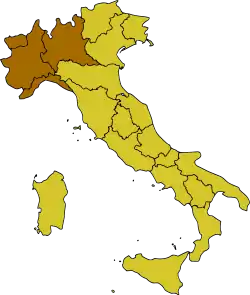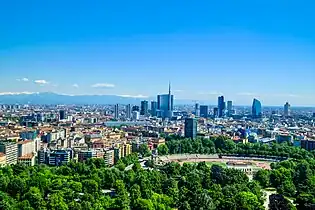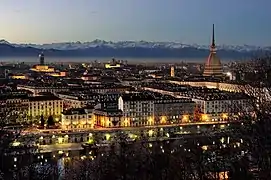Northwest Italy
| |
|---|---|
 | |
| Country | Italy |
| Regions | |
| Area | |
| • Total | 57,950 km2 (22,370 sq mi) |
| Population | |
| • Estimate (2022) | 15,817,057 |
| Languages | |
| – Official language | Italian |
| – Official linguistic minorities[2] | |
| – Regional languages | |
Northwest Italy (Italian: Italia nord-occidentale or just Nord-ovest) is one of the five official statistical regions of Italy used by the National Institute of Statistics (ISTAT), a first level NUTS region and a European Parliament constituency. Northwest encompasses four of the country's 20 regions:
Geography
It borders to the west with France via the Western Alps, to the north with Switzerland via the Central Alps, to the east with the regions of Trentino-Alto Adige, Veneto and Emilia-Romagna belonging to Northeast Italy and to the south with the Ligurian Sea and the extreme offshoot of Tuscany in Central Italy. Northwest Italy includes a large part of the Po Valley and is crossed by the Po river, the longest in Italy.
Demography
In 2022, the population resident in north-western Italy amounts to 15,817,057 inhabitants.[1]
Regions
| Region | Capital | Inhabitants |
|---|---|---|
| Aosta | 122,955 | |
| Genoa | 1,502,624 | |
| Milan | 9,950,742 | |
| Turin | 4,240,736 |
Most populous municipalities
Below is the list of the population residing in 2022 in municipalities with more than 50,000 inhabitants:[1]
| # | Municipality | Region | Province | Inhabitants |
|---|---|---|---|---|
| 1 | Milan | Milan | 1,354,196 | |
| 2 | Turin | Turin | 841,600 | |
| 3 | Genoa | Genoa | 558,745 | |
| 4 | Brescia | Brescia | 196,446 | |
| 5 | Monza | Monza and Brianza | 121,799 | |
| 6 | Bergamo | Bergamo | 119,534 | |
| 7 | Novara | Novara | 101,257 | |
| 9 | La Spezia | La Spezia | 92,119 | |
| 8 | Alessandria | Alessandria | 91,059 | |
| 10 | Como | Como | 83,184 | |
| 11 | Busto Arsizio | Varese | 82,951 | |
| 12 | Sesto San Giovanni | Milan | 78,884 | |
| 13 | Varese | Varese | 78,409 | |
| 15 | Cinisello Balsamo | Milan | 74,528 | |
| 14 | Asti | Asti | 73,421 | |
| 17 | Cremona | Cremona | 70,637 | |
| 16 | Pavia | Pavia | 70,636 | |
| 18 | Vigevano | Pavia | 62,076 | |
| 19 | Legnano | Milan | 59,941 | |
| 20 | Savona | Savona | 58,194 | |
| 21 | Moncalieri | Turin | 56,117 | |
| 22 | Cuneo | Cuneo | 55,744 | |
| 24 | Gallarate | Varese | 52,811 | |
| 23 | Sanremo | Imperia | 52,787 | |
| 25 | Rho | Milan | 50,299 |
Economy
The Gross domestic product (GDP) of the region was 580.3 billion euros in 2018, accounting for 32.9% of Italy's economic output. GDP per capita adjusted for purchasing power was 35,900 euros or 119% of the EU27 average in the same year.[3]
See also
References
- 1 2 3 4 "Bilancio demografico e popolazione residente per sesso al 31 dicembre 2022" (in Italian). Retrieved 29 July 2023.
- ↑ "Legge 482". Webcitation.org. Archived from the original on 24 September 2015. Retrieved 2015-10-17.
- ↑ "Regional GDP per capita ranged from 30% to 263% of the EU average in 2018". Eurostat.



